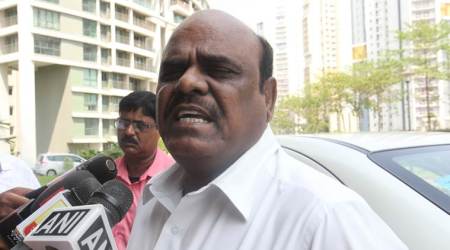 Newly sworn-in President Ram Nath Kovind waves as he leaves after inspecting a guard of honour in the forecourt of the Rashtrapati Bhavan in New Delhi on Tuesday. (PTI Photo, File)
Newly sworn-in President Ram Nath Kovind waves as he leaves after inspecting a guard of honour in the forecourt of the Rashtrapati Bhavan in New Delhi on Tuesday. (PTI Photo, File)
Halfway through Ram Nath Kovind’s campaign for the president’s office came the news that four sanitation workers had died of asphyxiation while cleaning a tank. It hardly sparked any prime-time debate or an editorial. It was taken as an old normal and ignored. I am confident that Kovind’s elevation to the highest constitutional office will put such savagery on the radar of our public discourse and change the mindset towards social discrimination.
In the past when I raised such issues in the Rajya Sabha and demanded a full debate on Dalits, many members have come to me and said: “Oh, never imagined that you are from SC community.” It was as if an issue concerning the Dalits is a matter to be raised only by the Dalits. Similarly, my demand to legislate to facilitate the appointment of Valmiki priests raised several eyebrows.
The irony in Kovind’s elevation to Rashtrapati Bhawan is that at a time when a Dalit from a very marginalised family of Uttar Pradesh has become the Republic’s 14th President and the Supreme Commander of its armed forces, many of the so-called low caste persons live a life where death by asphyxiation is common. Being a Dalit is still a matter of struggle and invites daily abuse in many parts of our nation.
Prime Minister Narendra Modi and BJP president Amit Shah’s “master stroke” is not that they chose a Dalit for the president’s office, but that through this seemingly political choice, they have brought the focus on contemporary Dalit struggles in India. It reveals an indomitable will to change the narrative.
It is hypocrisy to say that our religious books do not subscribe to caste-based discrimination because in our daily life the discrimination is seen, experienced and lived. The people who threw stones at us in Jaunsar Bawar area in Uttarakhand when we committed the “sin” of entering a temple with Dalits were all educated. The one who slit the throat of a Dalit for “touching his wheat flour” was a school teacher. Kowsalya belonged to a “higher” caste and she determinedly married Shankar, a “low caste” youth. Both were engineering students. Yet, Shankar was hacked to death in front of her in a busy marketplace in Tamil Nadu. One of the members of the current Cabinet told me how in his village the entire “higher caste” population refused to buy from the shop of a Valmiki on certain “auspicious” days.
Babasaheb Ambedkar’s most important contribution to the cause of social equality was that he injected a fighting fervour in an entire community. He didn’t want sympathy or patronage. He wanted to secure his right. Parity, not patronage, was his war cry. While Ambedkar’s followers didn’t move further, the RSS stepped in and pushed the equality agenda.
Unfortunately, due to the political apartheid against the RSS and isolation of its thought from all public discourse as a matter of “secular tabligh”, the Sangh’s contribution to social reforms has not been properly highlighted. Caste was never a mark of the RSS swayamsevak’s identity. Inter-caste and dowry-less marriages are solemnised in a large number of RSS families.
The largest number of tribals, SCs, fishermen, and those belonging to the low income groups form an indomitable chain of swayamsevaks in Kerala, Tamil Nadu, Maharashtra, and the eight states of the Northeast. More than 1,50,000 projects for education, economic development, health, and social harmony are run by RSS swayamsevaks in slums and areas with large Dalit population.
An RSS swayamsevak, Atal Bihari Vajpayee, conferred the Bharat Ratna on Babasaheb Ambedkar and another swayamsevak, the present prime minister, Modi, chose an Ambedkar follower, Kovind, for the president’s office.
Caste-based discrimination is essentially an Hindu issue. It is exemplified in the inhuman treatment meted out to Dalits. It has to be solved through Hindu efforts alone. The left-wing jihadis will only make the situation worse.
Ram Nath Kovind’s elevation to the president’s office has given a message of hope to those who have been at the bottom of the social strata. It has fuelled the aspirations of a people who are struggling to find equality. Kovind is one of them, so why can’t they too rise higher and lead? This confidence is the new social anthem now.

